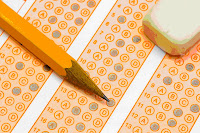Six Questions to Ask Your Child's Teacher
Seis Preguntas que puedes preguntar a la maestra de tu hijo/a
The teacher facilitator in our workshop mentioned that oftentimes parents just ask about behavior and let the teacher do the talking regarding academics. Asking about behavior is good, of course, but here are some other questions parents can ask their child's teachers:
- "Can you show me how my child is progressing in his/her work? (ask for running records, writing folders, math work, science, social studies)
- "¿Puede mostrarme como esta progresando mi hijo/a in su trabajo escolar?
- “What are my child's strengths?”
- “What does my child seem to like to do the most?”
- ¿Qué es lo que mas le gusta hacer a mi hijo/a en la escuela?
- “How are my child's social skills?”
- ¿Cómo es el comportamiento social de me hijo/a?
- “What would you like to know about my child that would be helpful to you as his teacher?”
- ¿Qué informacion necesita saber sobre me hijo/a que le pueda ayudar a conocerlo mejor?
- “What can we do at home to support you?”
- ¿Cómo puedo ayudar a mi hijo/a en casa para apoyarla?"




